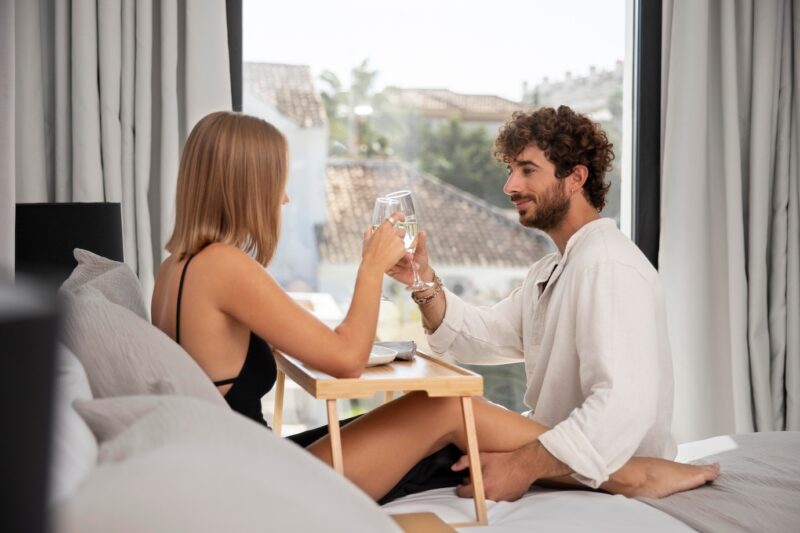Material wealth offers comfort and happiness, but its impact on long-term romantic relationships can be complicated. While luxury enhances emotional connections, it also brings challenges that can disrupt relational harmony. Factors like material values, economic pressures, and communication play key roles in shaping how couples balance wealth with emotional intimacy.
In a consumer-driven world, focusing on possessions can weaken emotional bonds, making relationships vulnerable. Recognizing the psychological effects of living in luxury helps couples sustain their relationships by addressing the complexities of wealth while prioritizing emotional depth and mutual respect.
Material Values and Interpersonal Relationships

Studies on materialism and consumer behavior provide insights into the psychological impact of living in luxury on long-term romantic relationship sustainability. It is known that higher income correlates with higher subjective well-being, although this effect diminishes beyond a certain financial threshold. This phenomenon suggests that additional wealth does not proportionately enhance happiness, which can subsequently influence relationship satisfaction. Research also indicates that material values promoted by consumerism can adversely affect relationship satisfaction as individuals may give precedence to material possessions over interpersonal relationships.
Materialistic values are often cultivated through social and familial environments, which can shape relationship dynamics. These environments may promote value systems that emphasize personal wealth and luxury. Consequently, individuals raised in such environments may struggle with maintaining romantic relationship sustainability as their values may conflict with those necessary for long-term relational harmony. As people focus more on acquiring and displaying luxury items, they may neglect emotional connection and shared experiences, which are essential to sustaining a relationship.
The Role of Economic Pressures
Economic uncertainty can impact consumer behavior and subsequently affect relationship dynamics. During periods of financial stress, lower-income households prioritize essential spending over discretionary expenses. This can lead to financial strain, which may become a source of tension for couples. The concept of “trading down” to more affordable consumption options reflects how economic pressures can influence lifestyle choices, potentially altering the quality of time spent together in a relationship.
In contrast, higher-income consumers who are less affected by economic fluctuations use luxury goods as a means of self-expression. This desire for individualization can influence relationship dynamics, especially if one partner places higher value on luxury items than the other. Disparities in lifestyle preferences can create friction between partners, making it essential for them to communicate effectively to sustain their relationship.
Luxury items can serve both functional and emotional needs, providing a sense of confidence and joy that can stabilize relationships. Emotional connections formed through luxury consumption contribute to relationship durability. Items like high-end accessories and leather goods can enhance the emotional bond between partners, promoting a sense of shared happiness and contentment. However, this dependence on material possessions can also create superficial attachments instead of fostering deep emotional intimacy.
Non-Traditional Relationships and Wealth

Examining non-traditional relationships, such as open relationships or being a sugar daddy, sheds light on how luxury lifestyles affect long-term romantic relationships. Open relationships, where partners agree to pursue other romantic or sexual interests, offer a unique perspective on how wealth influences relationship boundaries and satisfaction. These arrangements can reveal how partners navigate wealth disparities and the impact of luxury consumption on trust and relational balance.
In relationships where one partner identifies as a sugar daddy, there is a negotiation of expectations and maintenance of equilibrium. Wealth can play a pivotal role in how partners relate to each other, shaping the power dynamics and emotional exchanges within the relationship.
Trust and Communication

Healthy relationships prioritize trust, balance, and communication. Economic pressures test these traits, but relationships that uphold mutual consideration and consistency are more likely to endure. Trust in each other’s judgments and allowing space for personal growth fosters fulfilling relationships. Effective communication, where partners can express concerns without fear of negative reactions, greatly enhances relationship sustainability.
Luxury lifestyles often entail cultural immersion, such as staying in high-end accommodations or attending exclusive events. While these experiences can enrich a couple’s relationship, they also require ethical considerations to ensure they align with shared values and do not harm local communities. Aligning on these values can help sustain long-term romantic relationships by fostering a sense of shared purpose and mutual respect.
Emotional Connection and Well-Being
The emotional connection fostered by luxury items can be a stabilizing factor in relationships. High-quality goods, often seen in categories like accessories and leather items, cater to both functional and emotional needs, enhancing the well-being of the individuals in the relationship. The confidence and joy derived from luxury items can positively affect the relational dynamic by promoting shared happiness and satisfaction.
Romantic relationships have a significant impact on overall well-being. A healthy relationship contributes positively to both partners’ well-being, creating a supportive environment where emotional and psychological needs are met. Conversely, a strained relationship can detract from individual well-being, highlighting the importance of emotional connection and shared enjoyment in sustaining long-term relationships.
The Influence of Social Status on Relationship Perceptions

Social status and perceptions of luxury also impact long-term relationship dynamics. Individuals who seek status through material possessions may find themselves in relationships where appearances matter more than emotional depth. This can create an environment where partners feel pressure to maintain a luxurious lifestyle for the sake of external validation rather than internal fulfillment. Over time, this focus on maintaining social status through luxury can erode the emotional core of a relationship, leaving partners disconnected despite outward appearances of success.
Moreover, societal expectations often place pressure on couples to conform to certain standards of living. Those who continuously strive for a higher social standing may inadvertently prioritize material success over personal happiness, which can strain the emotional connection between partners. Sustaining a relationship in such an environment requires conscious efforts to prioritize emotional bonding over superficial status symbols.
The Psychological Toll of Wealth Disparities
In relationships where there is a significant disparity in wealth, the psychological impact can manifest in various ways. One partner may feel inferior or dependent, while the wealthier partner might feel burdened by unspoken expectations. This imbalance can lead to resentment, insecurity, or control issues within the relationship. Navigating wealth disparities requires open communication and mutual respect, as unresolved financial tensions often contribute to relationship breakdowns.
To maintain balance, couples must ensure that financial power does not translate into emotional dominance. Ensuring that both partners have an equal voice in the relationship, regardless of wealth, fosters mutual respect and emotional security, which are essential for long-term sustainability.
Conclusion
Understanding the psychological impact of living in luxury on long-term romantic relationships involves examining multiple factors, including material values, economic pressures, trust, and communication. While luxury can enhance the emotional bond between partners and provide a sense of shared joy, it can also introduce challenges that affect relational harmony. Emotional connections, ethical alignment, and effective communication are essential in balancing luxury living with relationship sustainability. Ultimately, navigating the complexities of wealth within a relationship requires prioritizing emotional intimacy and mutual respect, ensuring the longevity of the partnership.

